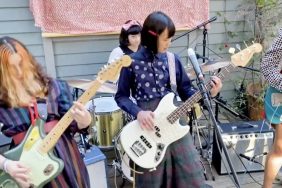Patti Smith, photographed by Jim Jocoy.
Picture it: San Francisco, late 1970s. The punk scene was in full swing and Do It Yourself was in the air. It was a time of youthful ingenuity and rebelliousness that was one part F the system and one part self-indulgence. It was at this time that photographer Jim Jocoy came upon an ingenious plan that resulted in some of the most iconic photographs taken at the time.
The 1970s was a time of Quaaludes. Inhibitions slipped and bold actions were taken without thought to consequence. Jocoy made regular trips to the 7-11 for Kodak color slide film. He loaded his camera, then headed on out to the clubs where he photographed everyone from Debbie Harry, Iggy Pop, and Patti Smith to Darby Crash, Exene Cervenka, and Sid Vicious. He also photographed the habitués of the scene, the young men and women that shined brighter than life, each radiating with some much pure and wild energy.
Also: Girls On Film | April Flores: Photographed By Carlos Batts
When he wasn’t out on the town, Jocoy worked in a copy shop, which featured a newly-arrived Xerox color copy machine. Jocoy had an arrangement with his employer, by which he could use the machine without charge up to a certain point. It was within these parameters that Jocoy worked, developing a D.I.Y. approach to art in the age of mechanical reproduction. He put the slides into a carousel that was mounted onto the machine, then arranged to project the slides onto a mirror that reflected the image on to the glass plate. Then he printed the photographs he had shot, ensuring that the only expense he incurred for the production of his art was processing the film at a local drug store.

Muriel Cervenka, photographed by Jim Jocoy.
The result of these escapades has produced some of the most celebrated images of the scene, much of which was collected in We’re Desperate: The Punk Rock Photography of Jim Jocoy (powerHouse Books), as well as some other more recently rediscovered works Jocoy shares with Crave. He observes, “When I was younger, the Fellini Satyricon film really influenced me. I became very interested in people that caught my eye visually and were dazzling. I like the bold, the fantastical, and the wonderful. The women on this scene, they are the girls who always had it. Everything about them was always just right. I went out with my camera like I was collecting beautiful, exotic night moths. They were a visual sensory delight and I was capturing a piece of it.”
He remembers, “I got to know Exene Cervenka quite well. My roommate at the time, Robert Lee, was the distributor of Slash in the SF/Bay Area. John Doe and Exene would stop over when X was touring. Their shows were just brilliant. They were very tight, like the California version of the Sex Pistols and the Clash. Exene had this very hypnotic stage presence. She could contort her body like a Victorian doll and morph from a hunchback into a sex goddess in one movement on stage where she would just thrash around. She was intense. I was mesmerized by her and Patti Smith. She was very awkward but sexually charged. I have always been very impressed by her energy and felt star struck around her.”
Drawn to the music, Jocoy saw the first—and last—performances of many of the scene’s legends when they came out West.
“At the very beginning of punk, performers like Patti Smith and Iggy Pop were very physical, dancing and thrashing on stage. I saw Patti the first time she came to the Bay Area. She performed in Berkeley. It was so insane. When I saw Patti, she did backbends on stage. It was the legacy of rock & roll, of sacrificing your body on stage. She was rough. She was jumping off things. It was amazing.”
Jocoy also photographed local musicians, like Penelope Houston of the Avengers. He remembers, “Penelope is still performing today. She just performed the other night. She’s a librarian now. I like that: from punk to librarian…. Penelope was always interesting. She came down from Seattle to study at the San Francisco Art Institute. A good segment of the punk scene came from that school. She helped originate the West Coast neo-folk music scene in the mid-1980s. Now she is keeping the archive of ephemera from back then.”
Jocoy remarks on the number of people who have died since his photographs were taken in the late 1970s. He observes, “Punk is an ephemeral thing. The Rolling Stones are still rolling along, and the Ramones are all gone.” Live fast, die young, and leave a beautiful corpse—or better yet, be remembered in the eclectic, electric photographs of Jim Jocoy.
All photos ©Jim Jocoy.
Miss Rosen is a New York-based writer, curator, and brand strategist. There is nothing she adores so much as photography and books. A small part of her wishes she had a proper library, like in the game of Clue. Then she could blaze and write soliloquies to her in and out of print loves.
Girls On film: Jim Jocoy
-
Debbie Harry by Jim Jocoy

©Jim Jocoy.
-
Exene Cervenka by Jim Jocoy

©Jim Jocoy.
-
Jennifer Miro by Jim Jocoy

©Jim Jocoy.
-
Penelope Houston by Jim Jocoy

©Jim Jocoy.
-
Trixie by Jim Jocoy

©Jim Jocoy.







